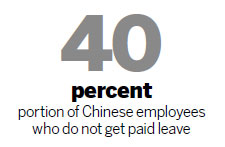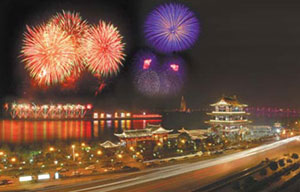Call for more holiday time

Leisure is crucial factor in people's happiness, says tourism official
More than 40 percent of Chinese employees do not get paid leave, according to a national survey of people's leisure time and vacations released on Sunday, the third China Tourism Day.
The study conducted by the National Tourism Administration collected data from 6,055 questionnaires filled out in seven regions and 14 cities.
According to a 2009 benefit and employment guideline released by Mercer, a consulting company focusing on human resources, China ranks last out of 39 countries and regions on paid holidays for workers.
Employees from the mainland get only 21 days of paid leave annually, including national holidays, compared with 41 for those in Brazil, which ranked first.
Tang Bing, an official with the National Tourism Administration, emphasized the importance of paid holidays at a seminar on Sunday in Chongqing, an activity to mark China Tourism Day.
"People's leisure time is crucial to their happiness," Tang said, adding that of the 60 percent of Chinese employees who get paid leave, only 31 percent are able to take it or arrange it when they choose.
Employees at State-owned companies or foreign enterprises get more paid holidays than those in the private sector, Tang added.
Shi Peihua, a professor at Beijing Jiaotong University who helped write the State guidelines to promote paid holidays, said the large number of Chinese people who take vacations during national holidays cause congestion problems such as traffic jams.
"If the paid holidays can be arranged by employees freely, people can take their leisure time in a relaxed way," Shi said.
He also encouraged public places such as museums to waive fees for visitors and said parks should reduce the cost of entrance tickets.
Tan Jialing, deputy mayor of Chongqing, said at the conference that residents traveled out of the municipality more than 290 million times last year.
She said the city government is working on promoting its tourism industry.
Chongqing has more than 50 vessels capable of carrying up to a million tourists each year on the Yangtze River, Tan said. She added that the city's cruises carried 500,000 tourists last year.
In February, the State Council published a guideline to promote paid leave, aiming to boost domestic consumption. The Tourism Law also took effect in April.
According to the guideline, the Outline for National Tourism and Leisure (2013-2020), a paid holiday system for employees will be implemented. Chinese people will enjoy more freedom to arrange holidays, which will boost their quality of life and increase domestic consumption.
Chinese youths are under heavy pressure at work, and some of them have no leisure time.
A 24-year-old employee at Ogilvy China, a public relations consultancy in Beijing, died of a heart attack at work on May 13. According to his micro blog, he had been working overtime for a month without a break.
Peng Bin, a Beijing social worker, said she has five days of paid leave a year. "I only get a week's notice to arrange my holiday, which means high travel expenses," she said.
She said her college friends are arranging for a 10-year anniversary party, but they had to change plans several times.
"No one can guarantee a three-day holiday," Peng said.
















